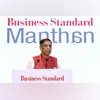The Goods and Services Tax (GST) Council has turned into a “rate cutting panel”, former chief economic adviser (CEA) Arvind Subramanian said on Friday while suggesting that the council should instead consider jacking up the rates, which would boost the revenue and reduce the need for renewing the compensation cess.
“My own view is that the compensation cess should not be renewed completely…because of a compensation induced moral hazard. Now, if you then say that the Finance Commission should make some provision for this … to compensate for that, that’s also a form of moral hazard. The solution to this has to be that rates go up, revenues go up, and the need for compensation diminishes,” he said at a conference organised by the Centre for Policy Research titled ‘The GST Story: Whither Next?’ in New Delhi.
The former CEA also said that India's GST system, which was introduced in 2017, remains highly complex and that there was a need for simplification.
“The GST regime is very complicated. There are 50 (different) cess rates and if I look at other things... it might go up to 100 rates,” Subramanian said.
Subramanian also raised concerns over what he described as “tax terrorism”, where excessive tax demands have become more prevalent under the GST. He emphasised that while tax-related issues have always been part of the Indian system, their intensity has escalated since the GST was implemented. The focus, according to him, should be on addressing this problem.
Also Read
Additionally, he pointed out that GST, introduced on July 1, 2017, aimed to streamline India’s tax structure by consolidating 16 indirect taxes and cesses previously managed separately by the Centre and states. This resulted in a more unified taxation system.
At present, the GST system has five broad tax slabs, 0 per cent, 5 per cent, 12 per cent, 18 per cent, and 28 per cent, with an additional cess on luxury and harmful goods. Subramanian, who had previously recommended a three-tier GST structure in 2015, criticised the GST Council for primarily focusing on reducing tax rates and providing exemptions, rather than considering rate increases to address revenue shortfalls.
While he acknowledged GST as a significant tax reform and a milestone in Indian economic policy, Subramanian cautioned that the complexity of the system and the rise in aggressive tax enforcement remain pressing issues that need urgent attention.

)